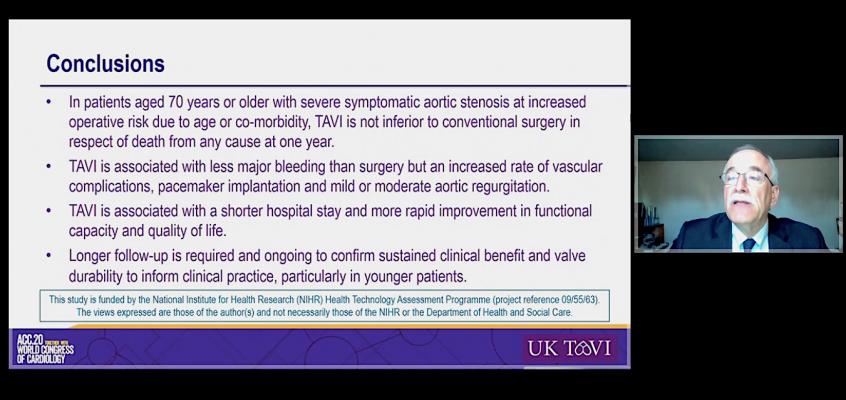
Conclusions from the real world TAVR vs. surgery trial for aortic valve replacement outcomes in the U.K., presented by William D. Toff, M.D. at ACC 20.
March 30, 2020 — Patients in the United Kingdom (U.K.) who underwent transcatheter aortic valve replacement (TAVR) did not have a higher rate of death at one year compared with those who had their heart valve replaced via open-heart surgery, according to research presented at the American College of Cardiology (ACC) 2020 Annual Scientific Session.
The trial compared approaches to replacing the aortic valve in patients with severe aortic stenosis. Traditionally, surgeons have replaced the valve via open-heart surgery, but the less invasive, catheter-based TAVR approach, has rapidly become more common in recent years.
Previous clinical trials have found TAVR to be non-inferior or superior to open-heart surgery for various patient groups, but most trials have been limited to medical centers that perform a high volume of procedures or focus on the use of specific types of replacement valves. The new trial involved a broad group of patients who were treated at every medical center that performs TAVR across the U.K. The study included all types of valves.
“The importance of this trial is that it confirms the effectiveness of the TAVR strategy in a real-world setting,” said William D. Toff, M.D., professor of cardiology at the University of Leicester and the study’s lead author. “It wasn’t only conducted at the best centers, and it wasn’t limited to a particular valve under ideal conditions. This was TAVR as it is in the real world compared with surgery as it is in the real world.”
The trial enrolled 913 patients referred for treatment of severe aortic stenosis at 34 U.K. sites from 2014-2018. Half were randomly assigned to receive TAVR and half underwent open-heart surgery. Enrollment was limited to participants age 70 years or older (with additional risk factors) or age 80 years or older (with or without additional risk factors).
Overall, participants were at intermediate to low risk from surgery, with a median Society of Thoracic Surgeons (STS) risk score of 2.6% (a score below 3% is considered low risk). However, researchers did not specify a particular risk score cut-off for enrollment. This allowed the trial to evolve along with changes in guidelines and practice regarding TAVR over the course of the study and to reflect physicians’
nuanced, real-world approach to considering risk in decision-making rather than taking a formulaic approach, Toff said.
"TAVI is associated with less major bleeding than surgery, but with an increased rate of vascular complications, implantation issues and mild to moderate regurgitation," Toff explained.
At one year, the rate of death from any cause was 4.6% among patients undergoing TAVR and 6.6% among those undergoing open-heart surgery, a difference that met the trial’s pre-specified threshold for non-inferiority of TAVR. Rates of death from cardiovascular disease, stroke and a composite of those two outcomes were similar between the two groups.
Pros and Cons of TAVR vs. Surgery in the U.K. Study
Patients who received TAVR had a significantly higher rate of vascular complications, which occurred in 4.8% of TAVR patients and 1.3% of those receiving surgery. TAVR patients were also more likely to have a pacemaker implanted, which was necessary in 12.2% of TAVR patients and 6.6% of those receiving surgery. In addition, patients who underwent TAVR had a higher rate of aortic regurgitation, a finding that might, in some cases, adversely affect long-term outcomes. Mild aortic regurgitation occurred at one year in 38.3% of patients undergoing TAVR and 11.7% of patients undergoing surgery, while moderate regurgitation occurred in 2.3% of TAVR patients and 0.6% of surgery patients.
On the other hand, patients undergoing TAVR had a significantly lower rate of major bleeding complications, which occurred in 6.3% of TAVR patients and 17.1% of those undergoing surgery. TAVR was also associated with a shorter hospital stay, fewer days in intensive care, and better functional capacity and quality of life measures at six weeks after the procedure. Functional capacity and quality of life were similar between the two groups at one year, however.
Toff said that the results reflect only a relatively short follow-up period, and that longer-term outcomes could reveal important differences. The researchers plan to continue to track outcomes for a minimum of five years.
“I think it’s important that we take a measured approach and individualize the decision-making for these patients, factoring in the patient’s preference and attitude to risk,” Toff said. “The results from our trial and others are encouraging, but patients need to be fully informed and know that the long-term durability of the TAVR valves and the long-term implications of the increased risk of aortic regurgitation are still
uncertain.”
This study was funded by the U.K. National Institute for Health Research (NIHR) Health Technology Assessment Programme.
Other Late-breaking TAVR Studies at ACC 2020:
TAVR Shows Favorable Safety in Patients with Bicuspid Valve
U.S. TAVR Outcomes Need Improvement Based on TVT Registry Analysis
TAVR Equivalent to Surgery at Two Years in Low-Risk Patients
POPULAR TAVR Shows Oral Anticoagulants Alone in AF Patients Reduces Bleeding Post TAVR
ACC 2020 Late-breaking Studies
Find more news and video from ACC 2020


 July 31, 2024
July 31, 2024 









